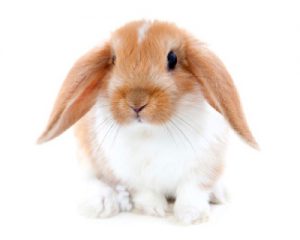Main Content
Fur mites, or “walking dandruff,” affect mainly rabbits, but also guinea pigs, hedgehogs, rodents, cats, and dogs. Although an uncommon host for the mite, these mites can also be transmitted to humans. The mites are nonburrowing skin parasites which cause the skin to become scaly. On close observation of an infested pet, movement of the dandruff is visible because the mites are moving underneath the scales. There are different species of fur mites that cross over and infest all pets and others that are specific to certain animals.
Mites are transmitted by direct contact with the host, animal bedding, or hair and debris. Therefore, it is important to clean and treat the environment while treating the animal. Treat any animals in contact with the infested animal even if they are not showing any signs.
The Rutgers Cooperative Extension fact sheet “Common Mites of Your Rabbit and Small Animals Part 1 – Fur Mites” provides an overview of the three types of mites, how they are transmitted, life cycle, signs and symptoms, and treatment.
By Jeannette Rea Keywood, State 4-H Agent, Department of 4-H Youth Development, Rutgers Cooperative Extension